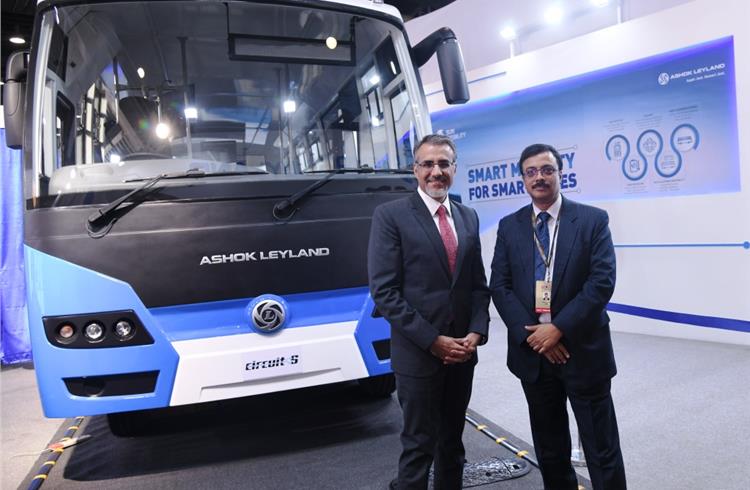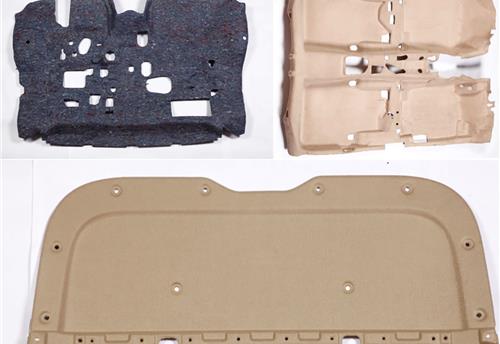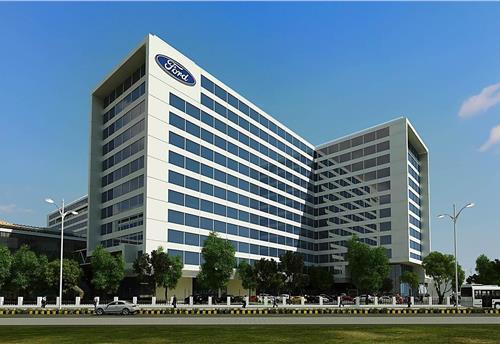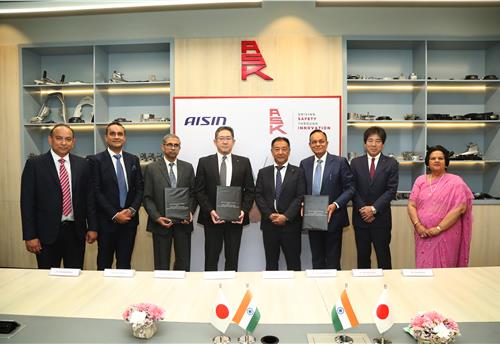Ashok Leyland unveils Circuit-S e-bus powered by Sun Mobility’s Swappable Smart Battery
In a move that is transformational for the mass transportation system in India, the Circuit- S, runs on easily swappable, smart batteries that are small and one-fourth the weight of a regular Lithium-Ion battery.
The global partnership between Ashok Leyland and Sun Mobility, announced in July 2017, took wings at the Auto Expo 2018. This partnership aimed at creating smart mobility solutions for smart cities took shape today with Ashok Leyland unveiling its first electric bus – Circuit-S – powered by Sun Mobility’s swappable Smart Battery.
The two companies have come together, leveraging India’s innovation and engineering potential to develop a truly world-class electric mobility solution. The first-of-its-kind technology demonstration, is an example of ‘Design in India’ and ‘Make in India’ capabilities of India. This solution, according to the company, is the answer to India’s rising e-mobility needs and global demand for smarter solutions for public transport.
In a move that is transformational for the mass transportation system in India, the Circuit- S, India’s First Swap Battery Bus which is designed for Indian conditions with seating capacity ranging from 25-35 seats, runs on easily swappable, smart batteries that are small and one-fourth the weight of a regular Lithium-Ion battery.
In a demo, Ashok Leyland and Sun Mobility showcased the ‘refueling/swapping’ of its electric bus in under 4 minutes, which is faster than conventional refueling along with the swapping of bus drivers and conductors at a depot. This solution, thereby, addresses issues of convenience and quick recharging options that have long been stumbling blocks for the acceptance and viability of electric vehicles for public transportation.
“Our vision is to transform public transportation by designing, developing, and marketing a breakthrough, India-specific solution that makes our city buses emission-free, cost-effective and scalable,” said Vinod K Dasari, managing director, Ashok Leyland. “We have been able to bring this unique, world-class solution to market within seven months of partnership with Sun Mobility. This idea has the power to change the way our public transport system works. We see this home-grown, world-class technology as the best solution for our transport authorities. The Circuit-S bus will cost lesser, would require minimal maintenance owing to lesser moving parts, will be lighter owing to smaller battery pack and most importantly, it will have zero tailpipe emissions. We certainly see this technology solution as the biggest enabler for our STUs and the biggest contributor to our nation’s mobility vision of becoming 100 percent electric,” he added.
“The future of public mobility is undoubtedly electric. The Sun Mobility way combines smart batteries, quick interchange stations, clean energy – all linked to a smart network that for the first time brings truly disruptive innovation to the part of urban mobility that has the greatest impact on the way people commute,” said Chetan Maini, co-founder and vice-chairman, Sun Mobility. “Partnering with a market leader like Ashok Leyland, we have been able to bring to life, mass mobility solutions that are customized for India’s widespread public transportation needs,” he added.
By separating the battery from the bus, for the first time, the upfront cost of the bus is drastically reduced to be at par with a traditional diesel bus. The bus is uniquely designed for Indian mass transport usage as the compact and light form factor of the battery allows for more passenger space and standing room. The swappable technology is compatible across a variety of bus platforms and works on the pay-per-use model of battery consumption. This brings down the total cost of vehicle operations; both maintenance and energy.
Sun Mobility plans to build a network of Quick Interchange Stations that are easy to install and ensures quick refueling of busses to reduce down-time. The interchange station is customised for Indian conditions, ensuring optimal use of real estate space for a range of vehicles to be swapped. These stations are compact and modular, allowing flexibility of shifting basis demand in a cost-effective manner. The Smart Network helps keep a constant check on the battery vitals, station operations and enables fleet management.
RELATED ARTICLES
Uniproducts India targets 15% growth till FY2027, eyes new EV OEMs for NVH parts
The Noida-headquartered company, which is a leading manufacturer of roof liners, floor carpets, sound insulation materia...
Ford to build more EV software capability at Chennai tech hub
Ford Business Solutions India, which currently employs 12,000 personnel set to add 3,000 more; Ford, which is known to b...
ASK Automotive to set up JV with Aisin to sell aftermarket parts for cars
Ask Automotive will have 51% of the equity of the joint venture to be set up with Aisin Asia (Thailand) Company and Aisi...





 By Autocar Pro News Desk
By Autocar Pro News Desk
 07 Feb 2018
07 Feb 2018
 9726 Views
9726 Views









